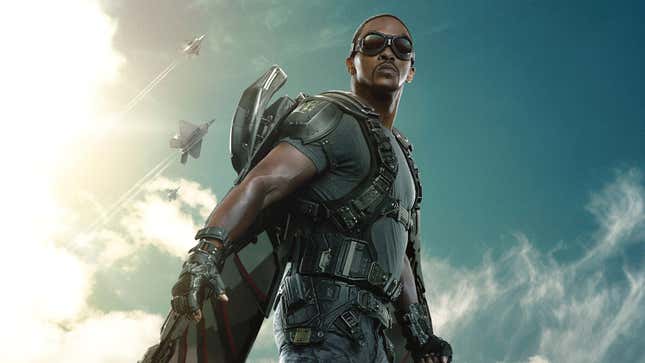Back in the early Marvel Cinematic Universe days, the second movies of a sub-franchise weren’t much to write home about. Both Iron Man 2 in 2010 and 2013’s Thor: The Dark World felt like unremarkable sequels compared to their predecessors, hamstrung by being fast-tracked before they were ready or just not doing much beyond offering some light spectacle.
That wasn’t the case with Captain America: The Winter Soldier. First released on April 4, 2014, the follow-up to 2011’s Captain America: The First Avenger felt like a breath of fresh air to the enterprise’s “Number Two” problem and is often looked back fondly as a high point for the Infinity Saga. Having recently rewatched the film, it more than earns that distinction, thanks largely to how confidently it carries itself, both on its own merits and compared to those aforementioned sequels. More than the original Avengers from two years prior, Winter Soldier really feels like it’s where the MCU properly grew into itself, and its shadow still looms over more recent entries.
By far, its biggest contribution is how it led to the MCU’s ostensible genre shift. It became popular to say movies that followed were “x genre, but Marvel.” The Ant-Man movies were the studio’s take on family-friendly heist films; Black Panther was a spin on Afrofuturism; Shang-Chi’s a Marvel kung fu movie; and so on. That all stems from the Cap sub-franchise more broadly and Winter Soldier specifically: First Avenger was borrowing from pulp films like Indiana Jones, while Winter Soldier was clearly influenced by political and spy thrillers like the Bourne movies or Three Days of the Condor, as evidenced by the casting of Robert Redford as SHIELD honcho Alexander Pierce.
Whether or not those descriptors truly fit is another conversation, but Winter Soldier’s definitely making an effort to be those movies. It results in some of the film’s best setpieces, like the opener with Cap, Black Widow, and a strike team doing a stealth rescue op on a SHIELD vessel and a mid-film shootout turned 1v1 brawl on a DC causeway. Everyone being a gunshot or stab wound away from death significantly ups the tension—and comedy, in the instances where someone’s on the business end of Steve’s shield (or just his entire body). The Winter Soldier himself feels pulled from spy thrillers with menacing henchmen (and single-minded slasher villains) who pop up by surprise, backed by a solid musical theme to sell their menace.
So big was Winter Soldier that Marvel effectively went all-in on it. Winter Soldier directors Anthony Russo and Joe Russo were tapped to direct Captain America: Civil War two years later, followed by Avengers: Infinity War and Endgame to close out the Infinity Saga. (The Russos have since tried replicating that success outside of Marvel with movies like The Grey Man and Cherry, with mixed results.) Winter Soldier’s supporting players also had solo adventures in the spy mold: Black Widow, the Nick Fury-led Secret Invasion, and Falcon & the Winter Soldier all tried to get back some of that spy thriller magic. While the original Widow and Fury are (mostly) out of the game now, Sam and Bucky are set to individually headline Captain America: Brave New World and Thunderbolts in 2025.

But all this imitation and success only went so far. Both Winter Soldier and Civil War had things to say about the U.S. surveillance state and superheroes’ relationship with the government, but don’t fully afford the space for those conversations to happen. It’s particularly damning with Civil War, which never really gives a solid viewpoint on the matter of superhero registration to anyone who isn’t already (or soon will be) suiting up to punch monsters or shoot spies in the face. Some of this is just the MCU’s worldbuilding issues bleeding over into Cap’s trilogy, other times, it’s problems borne from Winter Soldier. (Case in point: Falcon & the Winter Soldier’s messy handling of race and geopolitics.) As much as it tries to be something deeper, it’s still a Marvel summer blockbuster at the end of the day.
Recently, current Captain America Anthony Mackie mentioned he feels the MCU only has “so much creativity” in the tank. It’s easy to deride, but I think his statement gets at how the movies backed themselves into a corner. With the Cap movies in particular, they’re locked into being politically tinged action-thrillers. They can’t embrace stupidity like the Mission: Impossible or Fast films, and they’re unable to be casually slick spy flicks like James Bond movies or Tenet. Worse, they almost certainly can’t lean into some of the sillier parts of Captain America’s history, like turning Sam into a werewolf or letting him telepathically communicate with birds. Part of the fun of spy movies is that they veer between serious grounded fare and lovably goofy material, but the MCU’s deprived itself of some of that silliness—just ask folks holding out hope for the Serpent Society.
The Winter Soldier is still pretty great on its own merits, and features what’s probably the best work of its cast and crew in all the MCU. It was worth returning to and a good reminder of why these movies were easy to get invested in a decade ago. I just also wish it didn’t seem to slowly pigeonhole its particular corner of the MCU and lead to the franchise’s weaker aspects.
Want more io9 news? Check out when to expect the latest Marvel, Star Wars, and Star Trek releases, what’s next for the DC Universe on film and TV, and everything you need to know about the future of Doctor Who.
Trending Products

Cooler Master MasterBox Q300L Micro-ATX Tower with Magnetic Design Dust Filter, Transparent Acrylic Side Panel…

ASUS TUF Gaming GT301 ZAKU II Edition ATX mid-Tower Compact case with Tempered Glass Side Panel, Honeycomb Front Panel…

ASUS TUF Gaming GT501 Mid-Tower Computer Case for up to EATX Motherboards with USB 3.0 Front Panel Cases GT501/GRY/WITH…

be quiet! Pure Base 500DX Black, Mid Tower ATX case, ARGB, 3 pre-installed Pure Wings 2, BGW37, tempered glass window

ASUS ROG Strix Helios GX601 White Edition RGB Mid-Tower Computer Case for ATX/EATX Motherboards with tempered glass…









